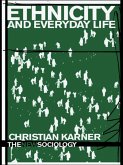Drawing on the first systematic study of cultural capital in contemporary Britain, Culture, Class, Distinction examines the role played by culture in the relationships between class, gender and ethnicity. Its findings promise a major revaluation of the legacy of Pierre Bourdieu's account of the relationships between class and culture.
Dieser Download kann aus rechtlichen Gründen nur mit Rechnungsadresse in A, B, BG, CY, CZ, D, DK, EW, E, FIN, F, GR, HR, H, IRL, I, LT, L, LR, M, NL, PL, P, R, S, SLO, SK ausgeliefert werden.
'Many books are being written about Pierre Bourdieu, turning him into a theoretical "classic". But Bennett, Savage and their colleagues have written a book to read alongside Bourdieu, using his work as a model and stimulation for continuing empirical inquiry. With rich new data they tackle the question of how specific Bourdieu's famous analysis of Distinction is to France. They show tastes are different in Britain, but that the analytic framework linking tastes to class, cultural capital and habitus is not only transportable but effective and revealing. This is an important book.'
-Craig Calhoun, President of the Social Science Research Council
'Culture, Class, Distinction defines the new research frontier in the sociological understanding of the intersection of culture and inequality. Resolutely empirical in orientation, the authors creatively build on and go beyond the seminal work of Pierre Bourdieu to consider simultaneously symbolic boundaries in the context of racial and ethnic diversity, gendered patterns of cultural preferences, specific fields of cultural practices (reading, music, the visual arts, the body), and much more. Social scientists within and beyond the UK have much to learn from this ambitious and path-breaking collective research.'
-Michèle Lamont, Professor of Sociology at Harvard University.
'A superb achievement: at once a cogent theoretical reappraisal of Bourdieu's masterwork of 20th century sociology, and a uniquely wide-ranging study, offering powerful insights, into the changing contours of culture in British society today. Like Distinction, this book will remain a centrepiece of international sociology.'
-Georgina Born, Professor of Sociology, Anthropology and Music, University of Cambridge
'Culture, Class, Distinction is the most sophisticated mapping of British cultural practices and preferences ever undertaken. Using cutting-edge techniques of statistical analysis and engaging critically with the sociology of culture developed by Pierre Bourdieu, it explores the cultural dimensions of class, gender and ethnicity across a range of fields. This is a major contribution to understanding the roots of social inclusion and exclusion in British life, and a complex and subtle piece of social theory.'
-John Frow, Professor of English at School of Culture & Communication University of Melbourne
'The amount of labour that has gone into this work is nothing short of impressive. One can only be grateful for the information produced by the authors concerning the relation between social location and cultural practice in Britain today. But the book does a lot more than this. It offers a highly nuanced analysis of this information. It is an excellent example of how one can innovate theoretically while doing empirical research.'
-Ghassan Hage, Professor of Anthropology and Social Theory, University of Melbourne
'Bennett et al. will have a deservedly wider appeal. Anyone who teaches Distinction should draw on this work both for its empirical findings and the quality of its assessment of the arguments made by Bourdieu.'
-Ted Ulas, University of Sussex, in Cultural Sociology
'[Takes] advantage of the detail and scope of a customized nationally representative survey and of accompanying rich qualitative information to untangle the intricate distinctions of class, gender, age, and ethnicity that characterize cultural differences in contemporary Britain.'
-Ivaylo D. Petev, Stanford University, in European Sociological Review, Oct 2010
-Craig Calhoun, President of the Social Science Research Council
'Culture, Class, Distinction defines the new research frontier in the sociological understanding of the intersection of culture and inequality. Resolutely empirical in orientation, the authors creatively build on and go beyond the seminal work of Pierre Bourdieu to consider simultaneously symbolic boundaries in the context of racial and ethnic diversity, gendered patterns of cultural preferences, specific fields of cultural practices (reading, music, the visual arts, the body), and much more. Social scientists within and beyond the UK have much to learn from this ambitious and path-breaking collective research.'
-Michèle Lamont, Professor of Sociology at Harvard University.
'A superb achievement: at once a cogent theoretical reappraisal of Bourdieu's masterwork of 20th century sociology, and a uniquely wide-ranging study, offering powerful insights, into the changing contours of culture in British society today. Like Distinction, this book will remain a centrepiece of international sociology.'
-Georgina Born, Professor of Sociology, Anthropology and Music, University of Cambridge
'Culture, Class, Distinction is the most sophisticated mapping of British cultural practices and preferences ever undertaken. Using cutting-edge techniques of statistical analysis and engaging critically with the sociology of culture developed by Pierre Bourdieu, it explores the cultural dimensions of class, gender and ethnicity across a range of fields. This is a major contribution to understanding the roots of social inclusion and exclusion in British life, and a complex and subtle piece of social theory.'
-John Frow, Professor of English at School of Culture & Communication University of Melbourne
'The amount of labour that has gone into this work is nothing short of impressive. One can only be grateful for the information produced by the authors concerning the relation between social location and cultural practice in Britain today. But the book does a lot more than this. It offers a highly nuanced analysis of this information. It is an excellent example of how one can innovate theoretically while doing empirical research.'
-Ghassan Hage, Professor of Anthropology and Social Theory, University of Melbourne
'Bennett et al. will have a deservedly wider appeal. Anyone who teaches Distinction should draw on this work both for its empirical findings and the quality of its assessment of the arguments made by Bourdieu.'
-Ted Ulas, University of Sussex, in Cultural Sociology
'[Takes] advantage of the detail and scope of a customized nationally representative survey and of accompanying rich qualitative information to untangle the intricate distinctions of class, gender, age, and ethnicity that characterize cultural differences in contemporary Britain.'
-Ivaylo D. Petev, Stanford University, in European Sociological Review, Oct 2010









